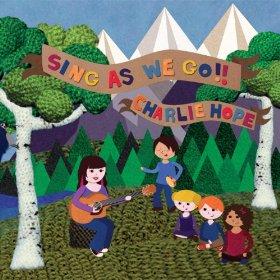When asked to name a Laurie Berkner song, most parents in the midst of the Berkner phase of their life would probably name "We Are the Dinosaurs" or "Pig on Her Head" or any of the peppy songs that I'm sure are still garnering lots of views on Sprout or Noggin or YouTube or wherever it is these the young turks are watching their music videos.
But Berkner's also written and perform some lovely lullabies over her kindie career. For my money, "Moon Moon Moon" is one of the best songs she's written, period. Given that she hadn't focused as much on slower nighttime songs, the decision to record Laurie Berkner Lullabies, her latest album, released earlier this summer, isn't that surprising.
Let's get the worst thing about the album out of the way -- the title. I can deal with the awkwardness of the title (the grammatical pedant in me keeps wanting to rename it "Laurie Berkner's Lullabies"), but I should warn you that this is probably not the soothing album you'll listen to quietly as you feed your infant at 2 AM or something your preschooler listener will drift off to sleep to. There are too many songs that are -- for a lullaby -- a bit too exuberant. In other words, taken as a whole, this album may not always work to aid sleep.
But if you reframe your perspective, if you instead think of this as a "cool down" quiet time album with songs that reassure the young listener that they're sounded by love, then on that level the album succeeds admirably. There are a number of new classic songs -- "Fireflies" most immediately comes to mind, but so does "A Lullaby" and "Stars Are Shining" -- that more closely approximate the more hushed tone I think of when the word "lullaby" comes to mind. She covers classic lullabies "All Through the Night" and "Little Boy Blue" and "I Gave My Love a Cherry (The Riddle Song)," all well done (Berkner's daughter Lucy duets with her on the latter).
Berkner's desire to revisit some of her classic tracks yields mostly positive results -- "In the Clouds" has too much production value to be an adequate lullaby, but it undoubtedly sounds better than the 15+-year-old version on Berkner's debut album Buzz Buzz. (I also like Berkner's duet with sometimes Laurie Berkner Band bassist Brady Rymer on a slightly simpler "Under a Shady Tree.") I don't like how Berkner complicated the simplicity of the original track of "Moon Moon Moon," but I understand why she wanted to try her hand at a new version. As always, Berkner's voice is a strength of the album, and she manages to avoid the overly precious approach that dooms a lot of lullaby album from repeat listening.
The 21-track 52-minute album will be most appropriate for kids ages 2 through 7.
I liked Laurie Berkner Lullabies quite a bit once I stopped insisting it be the perfect lullaby album. Berkner fans (and kindie fans generally) will not be disappointed -- it's an album that lets Berkner stretch some other songwriting muscles and show her playfulness in a more relaxed set of songs. Definitely recommended.
Note: I was provided a copy of the album for possible review.











